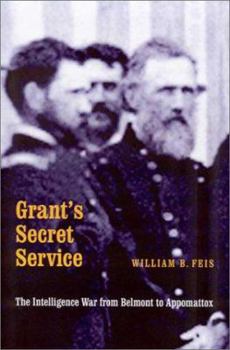Grant's Secret Service: The Intelligence War from Belmont to Appomattox
Select Format
Select Condition 
Book Overview
'The art of war is simple enough, ' said Ulysses S Grant. 'Find out where your enemy is. Get at him as soon as you can. Strike him as hard as you can and as often as you can and keep moving on'. This... This description may be from another edition of this product.
Format:Hardcover
Language:English
ISBN:0803220057
ISBN13:9780803220058
Release Date:January 2002
Publisher:University of Nebraska Press
Length:330 Pages
Weight:1.28 lbs.
Dimensions:1.2" x 6.7" x 8.9"
Related Subjects
Appomattox Campaigns & Battlefields Canada Civil War History Intelligence & Espionage MilitaryCustomer Reviews
3 ratings
Relevant for Today!
Published by Thriftbooks.com User , 19 years ago
This is a fascinating look at how intelligence was gathered during the Civil War. I found it a fast read. It was interesting to see how Grant progressed in his thinking/actions by way of his collecting of knowledge.
Author Knows His Stuff, But Text is Compilation of Articles
Published by Thriftbooks.com User , 21 years ago
William Feis knows what he is talking about--his doctoral dissertation was on this topic, and it is the most thorough monograph on Grant's use of military intelligence--known at the time as "secret service." The author shows an evolution in Grant's thinking and practice from early in the war through its final days. Grant was by nature aggressive--he was only supposed to demonstrate against the Confederate camp at Belmont, for example, and ended up attacking it. He felt that taking the initiative in battle made up for a lack of intelligence information--make the enemy wonder what you are doing rather than being too concerned about the enemy's situation. But later in the war, after Jubal Early's troops got away from the defenses of Richmond in 1864 without Grant's knowing, and went all the way up the Shenandoah to threaten Washington, Grant realized the importance of intelligence and beefed up his capability. While this book is a contribution to our understanding of Grant's views and practice of intelligence, the text is somewhat choppy, as are many books that are a collection of previously published articles. Other books on military intelligence, such as "The Secret War for the Union," would best be read prior to this one. However, despite it's limitations in scope and style, this book is well researched and is certainly worth reading.
Well-Intentioned, Terrible Maps and No Timelines
Published by Thriftbooks.com User , 21 years ago
I do not regret taking the time to read this book, and it is a well-intentioned worthy effort--however, given a new choice, I would probably go with the alternative, by an intelligence professional, "The Secret War for the Union: The Untold Story of Military Intelligence in the Civil War."I give the author, not an intelligence professional, high marks for the research, the story-telling, and the consistent themes. I give the editor and publisher low marks for the terrible maps (many seem to have lost their unit location markings and other key annotations) and the lack of tables showing "who knew what when..."Three themes stayed with me as I put the book down:1) A great deal can be accomplished in terms of intelligence with even a very small number of people--as few as 1-2 on staff, 3-5 behind the lines. We in America have substituted billions for technology and a cast of close to 100,000, for rather poor intelligence and counterintelligence.2) Maps, especially "information maps," are worth their weight in gold. I was reminded by this book that intelligence has in the past been an off-shoot of topographical engineering and map making, and do believe that we must restore the "hard-wired" connection between geospatial information and the "data" that our human, imagery, and signals professionals seek out.3) Deserters, prisoners, and legal travelers are a gold mine of information and must, must, must be systematically exploited. No matter the degree to which they may offer up untruths and deceptions, the bottom line is that any commander who fails to plan for the systematic exploitation of these human resources, and to do so in a timely fashion, is derelict in their duty. As I recall, we do not yet have a proper table of organization or equipment in the U.S. force inventory for handling such individuals--the worst battalion, or the over-burdened military police, or some kludge collection of reservists, seems to end up being the solution each time. This dereliction is even more costly in "low intensity" environments.I will not make too much of it, but I was especially pleased to see how much of Grant's intelligence came from enemy newspapers. The author seeks to make much--perhaps too much--of how Grant did not allow himself to be immobilized by a lack of intelligence, substituting initiative when intelligence was lacking, but I for one don't buy it. What I see in the book is a substantive appreciation by the General Commanding of the role of intelligence, however poorly manned or funded, and that makes all the difference.





